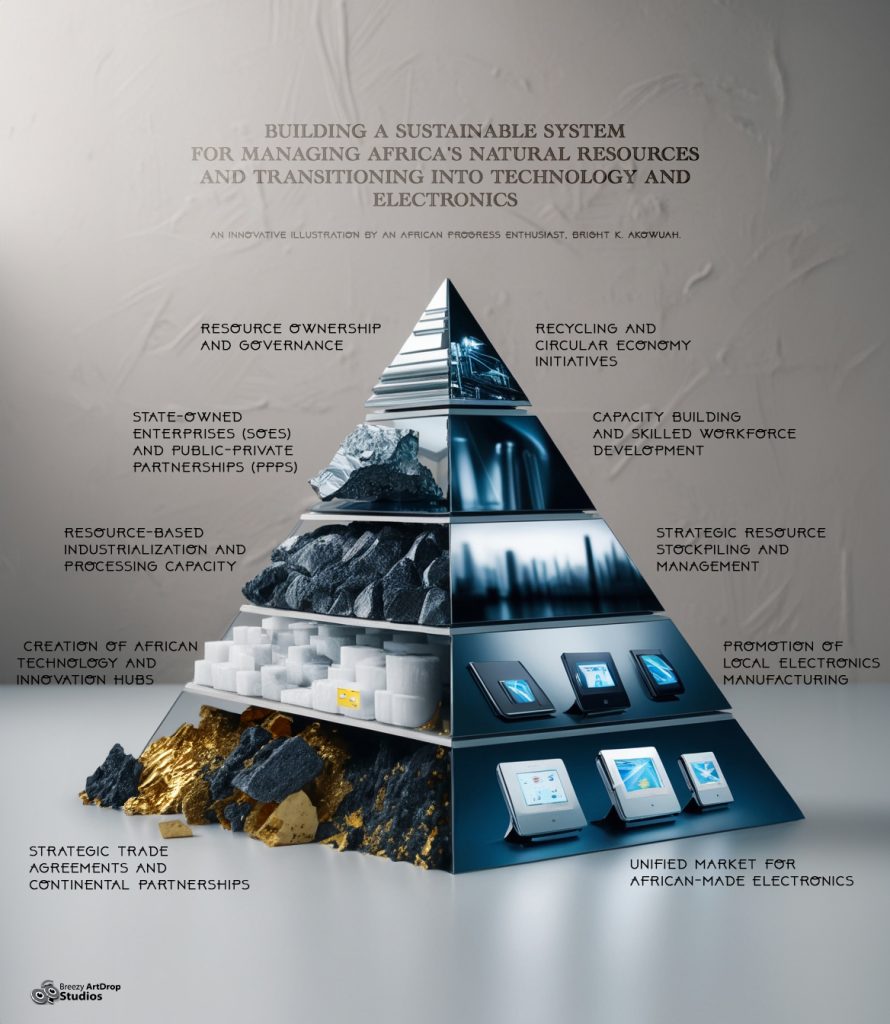
To implement a sustainable and efficient system for managing Africa’s raw resources and transitioning them into technology and final electronic products, the continent needs robust structures. These structures should ensure resource ownership, strategic partnerships, value addition, and manufacturing capacity, all while promoting innovation and sustainability. Here are key structures Africa should implement:
1. Resource Ownership and Governance
- Establish National Resource Agencies: Each African country with significant natural resources (e.g., cobalt in DRC, bauxite in Guinea) should create national agencies to oversee the management, extraction, and regulation of their resources.
- Transparency in Resource Management: Countries should ensure transparency in mining contracts and agreements through public disclosure and anti-corruption measures, ensuring the benefits reach local economies.
- Unified African Resource Policy: The African Union (AU) can create a continent-wide policy that sets guidelines for sustainable resource extraction, value addition, and equitable sharing of resource wealth among member states.
2. State-Owned Enterprises (SOEs) and Public-Private Partnerships (PPPs)
- Establish African State-Owned Enterprises for Resource Management: Similar to China’s SOEs, African countries should set up state-owned companies to control the extraction, refining, and distribution of their key resources like copper, rare earths, lithium, and cobalt.
- Foster Public-Private Partnerships (PPPs): Governments should encourage partnerships between state entities and private local or foreign companies that can provide the necessary expertise and technology for mining and processing, with the emphasis on African ownership and value creation.
3. Resource-Based Industrialization and Processing Capacity
- Develop Local Refining and Processing Plants: Africa should build regional processing facilities for key minerals like lithium, cobalt, and bauxite. These plants will add value to the raw materials before exporting or using them in domestic manufacturing.
- Technology Transfer Agreements: African governments should negotiate technology transfer agreements with international firms, ensuring that knowledge and technical expertise in mining and manufacturing are transferred to local workers and businesses.
- Investment in High-Tech Industries: Countries need to invest in and develop high-tech sectors that can absorb these refined resources. By promoting industries like electronics manufacturing, African nations can shift from being raw material exporters to producers of finished goods.
4. Creation of African Technology and Innovation Hubs
- Build Pan-African Innovation and Research Centers: These hubs would focus on electronics, materials science, renewable energy, and artificial intelligence. These centers will drive innovation in electronics manufacturing, working closely with local universities and industries.
- Local Entrepreneurship and Startup Support: Governments should provide financial and technical support to young entrepreneurs and innovators who want to venture into the electronics industry, ensuring they have access to resources, mentoring, and market access.
- R&D Partnerships: Collaborations between African research institutions and global tech companies should be promoted to harness innovation, focusing on how to use African resources in new and advanced technologies.
5. Strategic Trade Agreements and Continental Partnerships
- Continental Supply Chain Development: Through the African Continental Free Trade Area (AfCFTA), African countries can work together to create an integrated supply chain for electronics manufacturing. Countries rich in minerals can supply raw materials to those with processing capacity and manufacturing potential.
- African Resource Sovereignty Fund: Set up a continental investment fund to manage and invest in projects that promote the extraction, processing, and utilization of African minerals for high-value industries like electronics.
- Partnerships with Emerging Global Markets: Africa should form strategic alliances with non-traditional markets (e.g., South America, India) to share knowledge, resources, and technological advancements.
6. Recycling and Circular Economy Initiatives
- Establish a Robust Recycling Sector (Urban Mining): African countries should invest in e-waste recycling facilities to recover critical minerals such as gold, copper, and rare earths from discarded electronics. This will reduce the dependency on raw material mining and promote a circular economy.
- Create Incentives for Green Technologies: Governments should offer incentives for companies that adopt green technologies and sustainable practices in electronics manufacturing and recycling.
7. Capacity Building and Skilled Workforce Development
- Education and Vocational Training: African governments should invest in education and technical training to build a skilled workforce for the high-tech and electronics industries. Universities and technical institutes should offer specialized programs in electronics engineering, materials science, and industrial design.
- Knowledge Exchange Programs: Promote exchange programs with international universities and companies to allow African students and professionals to gain the necessary expertise in advanced manufacturing and electronics.
8. Strategic Resource Stockpiling and Management
- Create National Resource Reserves: African countries should establish strategic stockpiles of critical minerals (like cobalt, lithium, and tantalum) to ensure stable supply chains for domestic industries, mitigating against global market fluctuations.
- Continental Stockpile for Critical Materials: As a backup, the African Union can manage a shared continental reserve of critical minerals for use by African electronics and tech manufacturers.
9. Promotion of Local Electronics Manufacturing
- Set up Electronics Manufacturing Clusters: Create electronics manufacturing zones or clusters across Africa where companies can access raw materials, skilled labor, and infrastructure. These clusters could be located in strategic regions like East, West, and Southern Africa to create a regional electronics industry.
- Tax Incentives and Subsidies: Governments should provide incentives such as tax breaks, subsidies, or grants for companies that set up electronics manufacturing plants within the continent.
10. Unified Market for African-Made Electronics
- Promote African Electronics through Branding and Marketing: African countries should create a continental brand for African-made electronics, ensuring quality standards and creating trust among consumers and businesses.
- Create Distribution Networks: Establish African-wide distribution channels for electronics, ensuring that locally manufactured products have access to both regional and global markets.
